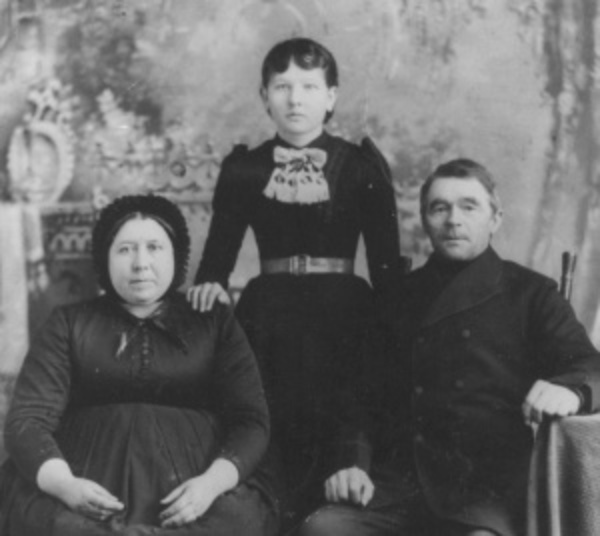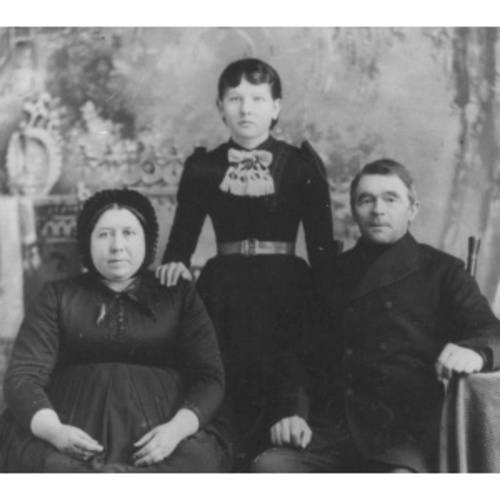
Source: Link
FUNK, JOHANN, Mennonite bishop; b. 26 Dec. 1836 in the Bergthal Mennonite settlement near Mariupol, Ukraine, fourth child of Peter Funk and Margaretha Braeul; m. first 5 Nov. 1857 Margaretha Braun (d. 1858); m. secondly 5 Oct. 1861 Susanna Rempel (d. 1880), and they had fourteen children, five of whom survived infancy; m. thirdly 23 Sept. 1880 Louise Dueck, and they brought up a foster daughter; d. 15 March 1917 in Altbergthal, near Altona, Man.
Johann Funk was baptized in 1857 and married that same year. In 1874 Bishop Gerhard Wiebe* persuaded the entire Bergthal colony, including Funk and his second wife, Susanna, as well as Funk’s parents, to emigrate to Canada. They settled in the village of Bergthal, founded in the East Reserve of southeastern Manitoba only months before their arrival. After Susanna’s death in 1880 Funk married Louise Dueck. At about the same time he and his wife moved to the village of Altbergthal, which had recently been founded in the West Reserve. Ordained minister in 1877, Funk was ordained bishop in 1882 to serve the Bergthaler Mennonite Church, a group which had been established in Ukraine around 1836 and by the early 1880s was also being established in the West Reserve.
More so perhaps than was the case with other Mennonite groups which had emigrated from Russia, a number of the members of the Bergthaler community of the West Reserve were open to change and were ready to adapt to certain Canadian ways, accepting railways, municipal government, and the development of trading centres. Some, including Funk, also sought improvements in education and a renewed spiritual life. In 1885 Funk encouraged the church to support the opening of a teacher-training institute for Mennonites. Most members of his church were opposed to the move, so a separate society was created in 1888 to raise funds for the school’s construction. In September 1889 the normal school, later known as the Mennonite Educational Institute, opened at Gretna with Wilhelm Rempel as teacher.
The first post-elementary school established among the Mennonites in Manitoba, the institute met with resistance from many who believed that higher education would destroy traditional values and cause confusion within the church. The increasing controversy came to a head in January 1892 during a series of meetings which Funk called to discuss the issue. The result was a schism in the Bergthaler church. The majority rejected Funk’s leadership and asked the leadership of the church in the East Reserve for a new bishop. Abraham Doerksen was ordained in 1893. The group which stayed with Funk and his program of renewal and education retained the name Bergthaler while the followers of Doerksen became known as the Sommerfelder Church, probably because their bishop resided in the village of that name.
The Bergthaler Church, at about 125 members or 60 families, was only one-eighth the size of the Sommerfelder, but in time it grew, welcoming members from some of the other Mennonite groups. By the turn of the century Funk needed help to serve the growing membership. Jacob Hoeppner became his assistant in 1903. The educational controversy took on new dimensions when the question of relocating the Mennonite Educational Institute arose in 1905. Funk favoured Altona, a more central location. In the end, the building in Gretna was in fact moved to Altona, but another school, the Mennonite Collegiate Institute, was constructed in Gretna in 1908. This arrangement was favoured by Hoeppner and the man who had led the school in Gretna since 1891, Heinrich H. Ewert*.
Funk’s leadership was somewhat compromised now, overshadowed as he was by Hoeppner. By 1910 he was being encouraged to resign and he did so in January 1911. He continued to show an active interest in the work of the church until his death in 1917. Although not outstanding in his leadership, as judged by later historians, he had guided his group through a crucial pioneer period of its existence. His role in the development of Christian education for Mennonites of southern Manitoba was particularly significant.
Mennonite Heritage Centre Arch. (Winnipeg), 715 and 718 (First Bergthaler Church reg.); 727 (First Bergthaler Church minutes); 1643 (Johann Funk papers); 4311 (Sommerfelder Church reg.). Aeltester Johann Funk: a family tree with notes on his life and work, ed. M. D. Jeffery (Winnipeg, 1980). G. J. Ens, “Die Schule muss sein”: a history of the Mennonite Collegiate Institute, 1889–1989 (Gretna, Man., 1990). H. J. Gerbrandt, Adventure in faith: the background in Europe and the development in Canada of the Bergthaler Mennonite Church of Manitoba (Altona, Man., 1970). William Schroeder, The Bergthal colony (rev. ed., Winnipeg, 1986).
Cite This Article
Lawrence Klippenstein, “FUNK, JOHANN,” in Dictionary of Canadian Biography, vol. 14, University of Toronto/Université Laval, 2003–, accessed December 12, 2025, https://www.biographi.ca/en/bio/funk_johann_14E.html.
The citation above shows the format for footnotes and endnotes according to the Chicago manual of style (16th edition). Information to be used in other citation formats:
| Permalink: | https://www.biographi.ca/en/bio/funk_johann_14E.html |
| Author of Article: | Lawrence Klippenstein |
| Title of Article: | FUNK, JOHANN |
| Publication Name: | Dictionary of Canadian Biography, vol. 14 |
| Publisher: | University of Toronto/Université Laval |
| Year of publication: | 1998 |
| Year of revision: | 1998 |
| Access Date: | December 12, 2025 |



